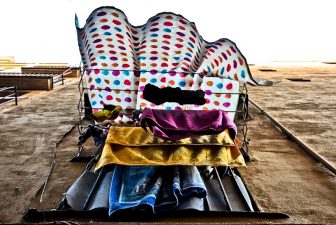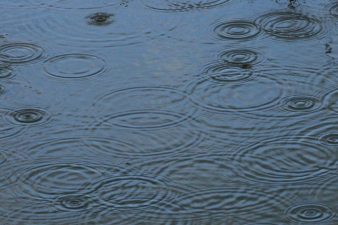 The Torah doesn’t talk much about breastfeeding, as it was taken for granted in ancient times. Moses’ mother doesn’t put bottles into the ark of bulrushes she sends down the Nile to save him from Pharaoh’s evil decree (Exodus 2).
The Torah doesn’t talk much about breastfeeding, as it was taken for granted in ancient times. Moses’ mother doesn’t put bottles into the ark of bulrushes she sends down the Nile to save him from Pharaoh’s evil decree (Exodus 2).
According to the midrashic commentary Moses refused to nurse from an Egyptian nursemaid, so the biblical text has Pharaoh’s daughter sending for a Jewish one. The nursemaid turns out to be none other than Yocheved, Moses’ own mother.
If the Torah and Midrash saw breastfeeding as merely a feeding method, Moses would have nursed from an Egyptian woman and the story would have ended. The rabbis recognized that without the early influence of Yocheved, Moses could not grow up to become the modest, compassionate, and dedicated leader who rescued the Jews from slavery and turned them into a nation that rejected Egyptian immorality.
An emotional bond
Mothers (and all who care for the baby), do not only tend to a baby’s physical needs. By comforting her baby in distress, a mother models empathy. A baby learns language, tone, and communication while hearing her mother’s voice. Resting in his mother’s arms, a baby gauges her emotional state as she responds to what is going on around her. As babies grow, the observe their mothers at their daily tasks and begin to imitate them. Breastfed babies must stay near their mothers, and this closeness ensures that they receive regular, if not constant, contact and interaction that all humans crave.
In our generation anyone can mix powder and water to feed a baby. One reason this option has become dominant is that our culture values independence for both adults and children. Diane Wiessinger, an American breastfeeding advocate who recently lectured in Israel, pointed out that in the media babies are often depicted alone, an unnatural condition for babies.
When my friend’s daughter told her teacher that her mother couldn’t come to a school party alone because she is nursing the daughter’s 2-month-old brother, the teacher suggested “leaving the baby with a bottle of Materna (the Israeli brand of formula).” With this kind of cultural attitude, adjusting to and accepting a baby’s intense dependence can be difficult for new parents.
The Talmud also emphasizes the importance of breastfeeding. A mother is considered a “meineket,” or nursing mother, until her child reaches 24 months. Even if a baby has weaned, he or she can return to nurse at any time until the age of two. Between the ages of two and four years, or five if the baby is unhealthy, a child who has weaned for longer than 72 hours may not return to the breast, and age five is considered the upper limit for nursing in Jewish law. The mother is advised to begin on the left side, “close to the heart.”
A difference of opinions
Rabbis differ about whether the laws relating to a meineket still apply today, when babies are usually not dependent on breastfeeding for survival. Some rabbis grant an exemption from fasting on minor fast days to all mothers with children under two, whether or not the mothers are currently nursing.
According to the Talmud, widows or divorcees with nursing babies under two may not remarry. The concern is that the husband will naturally want his new wife to bear his child, and the new pregnancy could lower the mother’s milk supply and potentially harm the existing child. One friend who lives in a haredi community told me that her husband’s rabbi advises all of his students to practice birth control until their children have turned two. And the rabbi of another haredi friend does not permit women in their community to wean earlier without a medical reason.
Future posts will discuss practical aspects of successful breastfeeding, Israeli government and hospital policies, and how to support breastfeeding mothers.
Related posts on Green Prophet:
Eco-Mum on Elimination Communication
Eco-Mum on Cloth Nappies
Hannah Katsman, a breastfeeding counselor, blogs at A Mother in Israel and can be reached at mominisrael at gmail dot com.
(image credit: Bible Explained)




I have fully breastfed my 3 children. the first one weaned at 21 months because I was expecting another and I was inexperienced. My RN told me it would’ve been alright to go all the way to 24 months despite pregnancy. I nursed the other two to the time of their birth of reaching 24 months. I hope to do so god willing with my 4th one.
I was upset to see not many Parent and Baby areas in the USA as I see in the UK. The Europeans highly value precious mother and baby moments/bonding.
Hi & thanks for the informative article. I was wondering whether you have a reference for below:
“Between the ages of two and four years, or five if the baby is unhealthy, a child who has weaned for longer than 72 hours may not return to the breast, and age five is considered the upper limit for nursing in Jewish law. ”
I am curious about the 5 years old upper limit. Thanks!
http://www.yoatzot.org/question.php?id=11448
I was curious too! See the bottom of this article for references.
I am a Christian and I am daily awed by how perfectly the Lord created our bodies to care for our babies. I am a nursing mother and I stumbled across this helpful article in my research into how long God intended His people to nurse their babies. Today’s society doesn’t nurse much or long and I LOVE nursing my Rosie. It was a sweet comfort to me that Jewish law (given to them by God) expected a woman to nurse until the baby is two. I want to do things God’s way and I like knowing its what He wants. I loved the reference to starting on the left side, close to the heart. How adorable is our Creator! Thank you!
Tinamarie, only saw this comment now. The rabbis get as much power as they are given, and in some communities that is a lot.
Hope, substances in breast milk protect a baby in the early months while his or her immune system is immature. My mother nursed me for a month–at that time women were told to nurse on a schedule.
I like your article, I totally agree that women should do the effort of breastfeeding their babies. I studied animal husbandry and animal nutrition, I ask this question don’t we are mammals? How do you think that we form our immune system? and the last question, did your mother nursed you when you were a baby? The more I read the Torah, the more clever knowledge that has a logic and scientific answer.
Totally appreciate the importance of breastfeeding and your convictions for it. Found this to be totally offensive: “And the rabbi of another haredi friend does not permit women in their community to wean earlier without a medical reason.” Since when did a rabbi get the power to make these decisions?
dlhdesign–Thanks so much for reading and commenting. I wrote:”According to the midrashic commentary Moses refused to nurse from an Egyptian nursemaid, so the biblical text has Pharaoh’s daughter sending for a Jewish one. The nursemaid turns out to be none other than Yocheved, Moses’ own mother.”I think we agree!-Hannah @Green Prophet
dlhdesign–Thanks so much for reading and commenting. I wrote:”According to the midrashic commentary Moses refused to nurse from an Egyptian nursemaid, so the biblical text has Pharaoh’s daughter sending for a Jewish one. The nursemaid turns out to be none other than Yocheved, Moses’ own mother.”I think we agree!-Hannah @Green Prophet
Great article, but you should know that it is NOT a midrash that Moshe's mother was the one to have breastfed him, it says it straight in the text – and of course this makes your point that much stronger – Shemot 2:7 – 2:9 (2:8 states “The girl (Miriam) went and summoned the boy's mother.”) Take a look!
Thank you for this article. I hope you will feature more like it in the future.
~ Maya
The New Jew: Blogging Jewish Philanthropy
I enjoyed reading this article very much! It is interesting and empowering to learn more about how breastfeeding our babies is not only the healthiest way to feed them but also the way The Almighty intended.
According to, Tzava’at Rabbi Yehudah HaChasid, “When nursing her newborn child for the first time, a mother should begin on the left side. because the baby should have his first meal from the place that’s closest to the seat of understanding – the heart.”
I believe this line of thought in Judaism proves the important role that breastfeeding DOES have in both feeding and mothering a child.
Thanks so much, Hanna, for expanding my education on breastfeeding. I hope to learn more from you on this subject so that I may continue to offer empowering information to moms. Yishar Koah
Hi Ziva,
The quote from the ganenet is an illustration, not a proof. I base my opinion on contact with thousands of breastfeeding mothers in Israel. Of course, you are free to disagree.
I am not judging mothers for choosing formula nor would I ever say that “a priority . . . should be given to breastfeeding . . . at the expense of caring for an infant’s wellbeing (ie. food intake and nutrition) at any cost (formula).” But priority should be given to breastfeeding, because it is the biological norm and because of the documented risks of formula feeding. Ninety percent of pregnant Israeli women say they intend to breastfeed, but 70% of babies get a bottle in the hospital.
I would like to see mothers to get the help they need *and want* to make breastfeeding work instead of being advised to wean at the first sign of trouble. Ideally they would get support and accurate information from the beginning to prevent problems. Despite the “prevalence” of breastfeeding in Israel this is not usually the case.
I think we can agree on the importance of caring for babies lovingly, and this is not dependent on the way they are fed. Preventing abuse and neglect is an important goal.
Wow. I’m not sure where to begin to explain how offensive your post is. Is it your complete unfamiliarity with the prevalent and popular culture of breastfeeding across Israel – by native and long-term Israelis? Is it your generalization of Israelis’ intolerance for breastfeeding and preference for independence by the overheard opinion of one person’s friend-of-a-friend’s-teacher’s-dog’s-grandmother? Is it your judgmental tone which derides ‘anyone can mix powder and formula’? Or is it your self-righteous sermon that presupposes a priority that should be given to breastfeeding, say at the expense of caring for an infant’s wellbeing (ie. food intake and nutrition) at any cost (formula)l?
Your assumptions here are maddening. For women who choose not to breastfeed for a variety of reasons, ranging from medical conditions to pure personal preference, it is ultimately their prerogative. Not yours to judge or quantify.
What we should be focusing on in Israel is not whether someone is or is not bonding with their baby according to your standards – or halacha’s if you choose to justify your choices that way. In Israel’s current society, with an increasing number of neglected and abused children, we should be focusing our efforts on supporting caring for children at any cost. Whether that includes breastfeeding or not should not matter.
Hi Hannah
I found your article most interesting and shows that there is so much in Jewish tradition that is compatible with good birthing and parenting.
As president and founder of the Israel Childbirth Education Centre, a childbirth educator and breastfeeding counsellor, our challenge is to create and parent-and-baby friendly environment in society, in the health institutions, in schools and Army where young people are educated and in the work-place.
I would like to continue receiving your articles. Shabbat shalom
Wendy Blumfield
Wow I did not know how much Judaism supports breastfeeding mothers. Awesome!